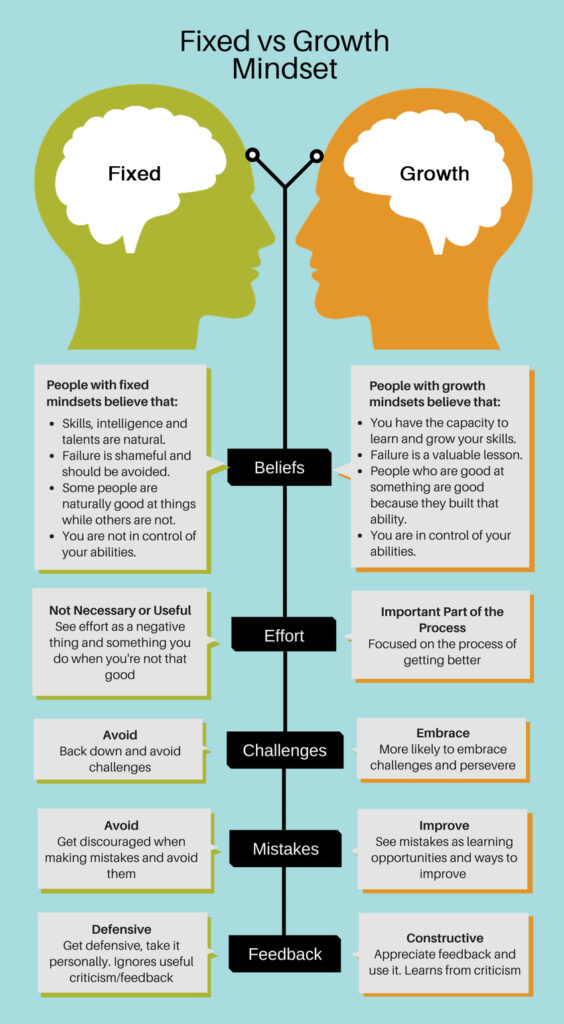Fostering Growth Mindset
 Overview and Introduction: The WHAT and WHO
Overview and Introduction: The WHAT and WHO
Growth Mindset is a concept introduced by Carol S. Dweck in her 2007 book, Mindset: The New Psychology of Success [1]. Individuals with a “growth mindset” believe that their academic success can be developed through hard work, good strategies, and input from others. The opposite is a “fixed mindset”, where individuals attribute academic success or failure from fixed or finite factors, such as one’s innate intelligence. Many of the principles of this book have been applied at all levels of education and evidence supports that a teaching environment that fosters growth mindset through minor interventions may be an approach to improving academic outcomes for underrepresented students [2] and potentially for all students.
Fostering Growth Mindset is a tool that can benefit students in any class at any level.

 Implementation and Timing: The WHEN, WHERE, and HOW
Implementation and Timing: The WHEN, WHERE, and HOW

Image [7]
This guide provides quick and minimally invasive growth mindset techniques that can be distributed throughout a course. It is recommended that the growth mindset tone of the course be set early, to allow students the opportunity to utilize and apply the adjusted or reinforced mindset as often as possible.
These strategies work in-person, online, and can be incorporated into any assignment, project, or assessment.
Fostering Growth Mindset Strategies
- Set the tone. Experience, hard work, practice, good strategies, and support lead to skill, not inherent ability [1]. At the very start of each course, set the tone of the class with a focus on learning and growth. Helping students think about learning as a process and not an inherent ability leads them to be more willing to put in the time and gives them more confidence that they can do well in the course.
- Practicing music or practicing sports as an analogy to doing homework/preparing for exams.
- 10,000 hours of quality practice is what leads to expertise.
- Mentorship is needed to help students implement good strategies.
- Using questions as a path to self discovery.
- “I can’t do it” …yet (the power of yet).
- Reflection exercises as a tool to demonstrate and reiterate growth and the challenges required to grow. Consider reflection prompts that allow students to consider:
- “This is what I knew when we started, this is what I know now”
- “Compared to the beginning of the semester, this is how far I’ve come”
- “These are the challenges I endured and this is what I learned from them”
- Psychological Safety [3]. Create opportunities in the classroom to make mistakes and not suffer harsh consequences (grade decrease, ridicule). The students will learn more from the mistakes they make and the resulting corrections.
- Environment where failure is part of the learning. Create assignments where it is expected that they will do things wrong and have the opportunity to make corrections and resubmit.
- Open communication. Encourage working with others to solve problems (allowing students at different levels to learn/grow/teach, depending on where they are) and as a class, facilitating discussions and conversations that might be the wrong answer so the students can work together to figure out how to correct it.
- Challenge students to rethink existing norms. Not every problem should have a neat answer and students should be encouraged to challenge the existing methods and procedures.
- Value of iteration. Project-based learning provides the opportunity to try it, learn, try again, learn more, try again. For example, Lab 1 might be the first time they learn a concept – they’re given more guidance and the assignment has less impact on their grade. Lab 5 will use the same skill from Lab 1 – little less guidance, little more impact on grade. The Final project will use the same skill from Labs 1 and 5 – 3rd time practicing this skill and now assessment that impacts their grade.
- Teaching students not just how to function in the system. Consider, are you assessing how well they follow directions or how well they understand/apply a concept?
- “Success is a terrible teacher.” Using examples from industry, faculty can show how success in engineering can lead to complacency and explain how early failures are critical for learning (ex. NASA Space Shuttle Challenger [4]).
- Active Learning. Passive learning is where students watch as you lecture/demonstrate. Active learning has been proven to provide stronger understanding of concepts. (See the Active Learning: Overview and Introduction Quick Reference Guide for ideas for implementation.)
- Not rated as “fun”, but found to be more effective. When surveyed, students will regularly favor passive learning (traditional lectures). Students will think they learn more from lecture (passive learning is easier) but research has shown that active learning is more effective [8].
- Learning is hard – challenge them. Active learning takes more energy and is therefore more challenging. Part of encouraging a growth mindset includes challenge as part of the process.
- Social Priming [5]. The minds of individuals can be “primed” and result in improved assessments. Actions and emotions can be primed by events of which you are not aware. Priming may have a powerful effect on intuitive performance (i.e. memory recall). A few examples of primers before an exam include:
- Words of encouragement. These can be vocalized or included in the exam instructions. Reminder that an assessment is not a judgment of the person’s value. Expressing pride in a student’s hard work reinforces a growth mindset. Positive priming has been proven to speed up memory retrieval. [4]
- Growth mindset reminder. Reduce anxiety for students using reminders that this is only one assessment and the goal is not to judge, but to determine what they need to work on. We are always trying to improve and the assessment is a method to determine what needs more work and what has been mastered.
- Think like an engineer. There is some data that claims cognitive and physical abilities are slightly altered based on how an individual “pictures” themselves. When primed to think about being old, participants walked and responded measurably slower [4]. Prime students right before an assessment to think like engineers. Similar to the way athletes may visualize the shot they’re hoping to make, have students visualize themselves as engineers and call themselves engineers prior to the start of taking on a challenge.

 Rationale and Research: The WHY
Rationale and Research: The WHY
Fostering growth mindset in your courses can be done with minor, minimally invasive techniques that could lead to increased student success. As an instructor, you can pick and choose which methods fit in your existing courses, not requiring any major overhauls or you can plan out major course changes with growth mindset strategies in mind. Either way, the effort and time spent is adjustable and the risks are negligible.

 Additional Resources and References
Additional Resources and References
Interested in learning more? Here are references and links to the resources and references cited in this guide.
[1] Dweck, Carol S. (2006). Mindset : the new psychology of success (1st ed.). New York: Random House. ISBN 1-4000-6275-6. OCLC 58546262. You can also find her Ted Talk here.
[2] Broda, Michael; Yun, John; Schneider, Barbara; Yeager, David S.; Walton, Gregory M.; Diemer, Matthew (2018) Reducing Inequality in Academic Success for Incoming College Students: A Randomized Trial of Growth Mindset and Belonging Interventions, Journal of Research on Educational Effectiveness, 11:3, 317-338, DOI: 10.1080/19345747.2018.1429037
[3] Grant, Adam (2021). Think Again: The Power of Knowing What You Don’t Know, New York, Viking (Random House Publishing). ISBN 9781984878113.
[4] https://www.history.com/news/how-the-challenger-disaster-changed-nasa
[5] Kanheman, Daniel (2011). Thinking, Fast and Slow, New York: Farrar, Straus and Giroux. ISBN 978-0-374-53355-7. OCLC 1226719491.
[6] https://www.mindsetworks.com/Science/Teacher-Practices
[7] https://www.aot.edu.au/aot2017/wp-content/uploads/Fix-vs-Growth.jpg
[8] Acevedo, Emily; Lazar, Alexandra J.; Active Learning and Interpersonal Skills Development among First-Generation College Students, International Studies Perspectives, 2021; ekab010, https://doi.org/10.1093/isp/ekab010